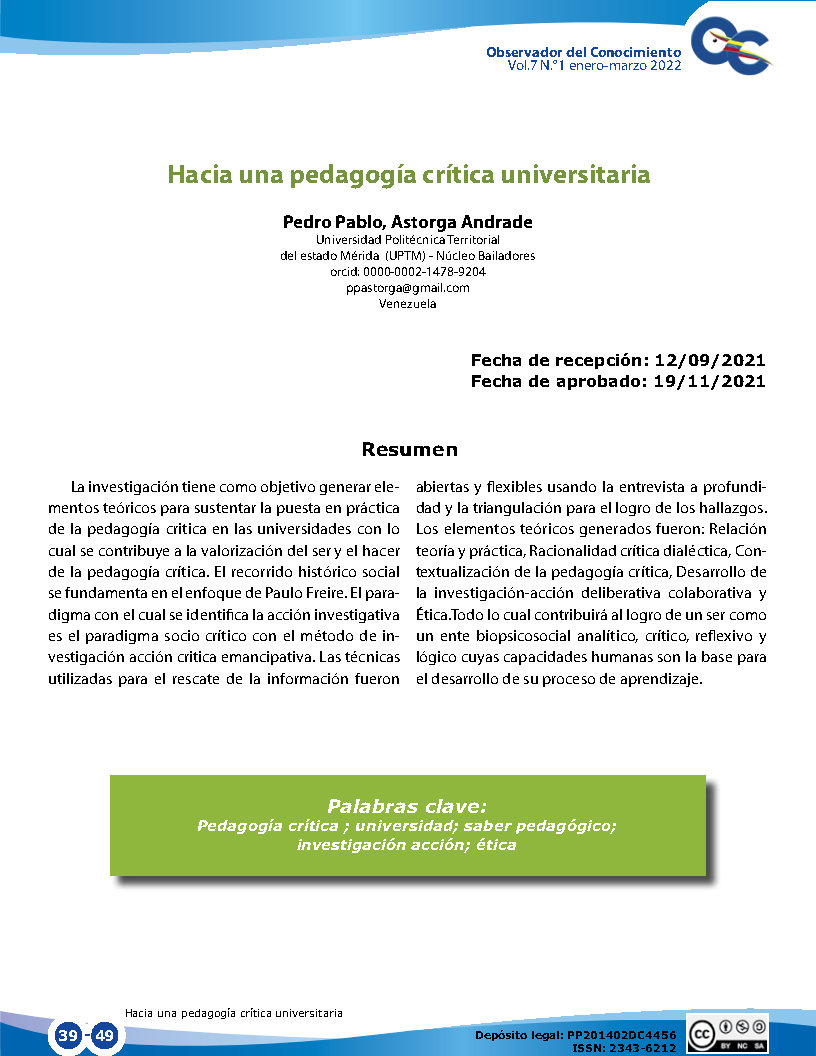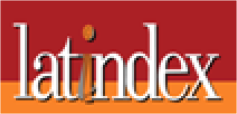Towards a Critical University Pedagogy
Keywords:
Critical pedagogy, university, pedagogical knowledge, action research, ethicsAbstract
The research aims to generate theoretical elements to support the implementation of critical pedagogy in universities, which contributes to the valorization of being and the making of critical pedagogy. The social historical journey is based on Paulo Freire's approach. The paradigm with which the investigative action is the socio-critical paradigm with the method of emancipative critical action research. The techniques used for information rescue were open and flexible using in-depth interviewing and triangulation to achieve the findings. The theoretical foundations generated were: Relationship theory and practice, Dialectical critical rationality, Contextualization of critical pedagogy, Development of collaborative deliberative action research and the éthics. All of which will contribute to the achievement of a being as an analytical, critical, reflective and logical biopsychosocial entity whose human capabilities are the basis for the development of its learning process.
Downloads
References
Alvarado, L. y García, M. (2008) Características más relevantes del paradigma socio-crítico: su aplicación en investigaciones de educación ambiental y de enseñanza de las ciencias realizadas en el Doctorado de Educación del Instituto Pedagógico de Caracas. Revista Universitaria de Investigación, Año 9, número 2. Caracas, Venezuela.
Arnal, J. (1992). Investigación Educativa. Fundamentos y Metodologìa. Barcelona, España: Labor.
Astorga, P. (2021). Hacia una Pedagogía Critica Universitaria. Tesis doctoral. Universidad Politécnica Territorial del Estado Mérida Kleber Ramírez. Doctorado en Pedagogía.
Corbetta, P. (2007). Metodología y Técnicas de Investigación Social. España: Ed. McGraw-HILL/Interamericana de España, S.A.
Freire, P. (2005). Pedagogía del oprimido. Buenos aires: Siglo XXI.
Freire, P. (1996). Política y Educación. Mexico Siglo XXI editores
Freire, Paulo (1996), La importancia de leer y el proceso de liberación, México, Siglo XXI.
Freire, P. (1977). Cartas a Guinea Bissau: apuntes de una experiencia pedagógica en proceso. México: Siglo XXI Editores.
Freire, P. (1976). La educación como práctica de la libertad (17ª ed.). México: Siglo XXI Editores.
Freire, P. (1970). Pedagogía del oprimido. Siglo XXI: México.
Guba, E. y Lincoln, Y. (2002), Paradigmas en competencia en la investigación cualitativa. En Denman, C. y JA. Haro(comps.), Por los rincones. Antología de métodos cualitativos en la investigación social. El Colegio de Sonora. Hermosillo, Sonora México.
Grundy, S. (1982). Three modes of action research. En Kemmis, S. y McTaggart, R. (ed.) ( 353- 364): The Action Research Reader (3ª ed..), Victoria: Deakin University.
Habermas, J. (1986). Conocimientos e interés en ciencia y técnica como ideología. Madrid: Tecnos.
Habermas, J. (1984). Ciencia y técnica como ideología. Madrid: Tecnos.
Martínez, M. (2006) L a Investigación Cualitativa (Síntesis Conceptual). Revista IIPSI Facultad de Psicología UN M S M ISSN: 1560 - 909X VOL. 9 - Nº 1 -PP. 123 - 146, planificación y aplicación de mejoras. Revista Interuniversitaria del Profesorado, 39, 51 – 73
Taylor, J. y Bogdan, R. (1992). Introducción a los métodos cualitativos en investigación. La búsqueda de los significados. Ed. Paidós, España.
Taylor, S. y Bogdam, R. (1986). Introducción a los métodos cualitativos de investigación, Buenos Aires: Paidos.

Downloads
Published
How to Cite
Issue
Section
License
Copyright (c) 2022 Pedro Pablo Astorga Andrade

This work is licensed under a Creative Commons Attribution-NoDerivatives 4.0 International License.







